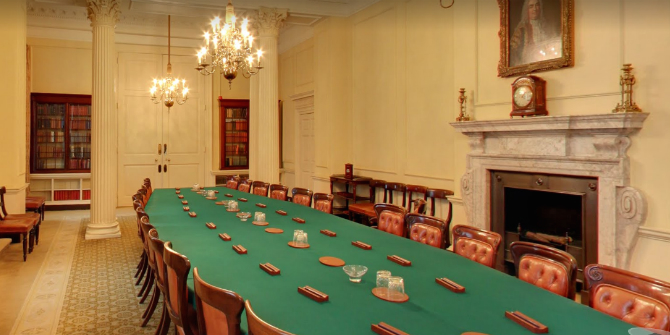
Robert Brett Taylor (University of Aberdeen) discusses constitutional conventions under the post-Brexit constitution. He asks whether there is a continued constitutional purpose for the Convention of Collective Cabinet Responsibility in the modern era? He maintains that, despite current turmoil, it would be premature to say that the Convention is broken as a result of Brexit.
Theresa May’s attempts to deliver Brexit have been marked by an unprecedented breakdown in discipline amongst her ministers. The Government’s Chief Whip Julian Smith recently criticised ministers for their unruly conduct, saying that it was the ‘worst example of ill-discipline in cabinet in British political history’. Indeed, criticism has been levied in particular against several cabinet ministers and other junior ministers who, in March 2019, defied government orders by abstaining rather than voting against a motion to prevent the UK leaving the EU without a deal. The ministers did so without resigning. This breakdown in discipline has now apparently extended to non-Brexit issues. On 1 May, Gavin Williamson was sacked from his position as Secretary of State for Defence for allegedly leaking information from the National Security Council to the media. Williamson fiercely denies the allegations, but Prime Minister Theresa May claims that there is ‘compelling evidence’ of Williamson’s guilt.
These incidents have exposed growing concerns over discipline within Theresa May’s cabinet, raising questions over the extent to which the Convention of Collective Responsibility (a.k.a. the Convention of Collective Cabinet Responsibility) continues to apply as a result of Brexit. It is argued however that the answer to this question turns on the purpose of the Convention, something that is often overlooked in these discussions.

The Convention of Collective Responsibility is a political and therefore non-legally binding rule of the UK Constitution which can be found in both the Ministerial Code and the Cabinet Manual. It stipulates that government ministers, in particular the cabinet, must publicly agree and abide by government decisions (irrespective of their personal views) and that they should not disclose what was said privately amongst government ministers in reaching these decisions. Should a minister be incapable of doing this, they are expected to resign. If they don’t resign, the Prime Minister has the right to dismiss them.
Geoffrey Marshall, a leading constitutional scholar, once described Collective Responsibility as an ‘entitlement conferring’ convention, where the Prime Minister is given a right – the solidarity of her Cabinet – which she can invoke or suspend (G. Marshall, Constitutional Conventions: The Rules and Forms of Political Accountability (Oxford: Clarendon Press, 1984), pp.8 and 57-58). Indeed, David Cameron suspended the Convention in relation to the 2016 referendum on EU membership, and had previously agreed with Nick Clegg as part of the Coalition Agreement to suspend it in relation to key areas of policy where the Conservatives and the Liberal Democrats disagreed.
However, Marshall’s understanding of the Convention, although compelling, is nevertheless incomplete and therefore not fit for purpose under the modern UK Constitution. Constitutional conventions, as the name suggests, are political rules which embody constitutional principles and values. If a constitutional convention does not have a constitutional purpose, they should not be called as such. Historically, Collective Responsibility was developed in order to protect government from an interfering Monarch seeking to divide his ministers. The Convention, therefore, had a clear and vital constitutional purpose during the early years of the UK’s constitutional settlement in the eighteenth century. This purpose, however, is no longer relevant today as the UK is now firmly a constitutional monarchy whereby the role of the Monarch has been minimised in favour of ministers.
Following this, the question arises as to whether there is a continued constitutional purpose for the Convention in the modern era. If it is the case that Collective Responsibility only confers a right exclusively on the Prime Minister to have her ministers agree publicly with her policy and decisions, without any purported benefit to Parliament or the public, why should it matter constitutionally if her ministers refuse to do so and she is incapable of enforcing her right? A better understanding of the modern Convention of Collective Responsibility, and one that I have made elsewhere, is that the purpose of the Convention is to provide a standard of behaviour – Cabinet solidarity – by which government and its suitability for office can be judged by both Parliament and the public. After all, the Queen appoints as Prime Minister the person who can command the confidence of the House of Commons, and that person must maintain that confidence if they wish to remain as Prime Minister. This includes that person’s ability to maintain the support of her ministers. Should a government instead appear divided, the House of Commons may reasonably conclude that it is no longer worthy of its confidence. If so, as stipulated under the Fixed-term Parliaments Act 2011, a vote of no confidence could be held, and a new alternative government could be formed either within a two week period or, if necessary, after a general election. This reading takes a wider view of the Convention than that by Marshall: it is not merely an entitlement of the Prime Minister, but a measure for the House of Commons.
On this reading of Collective Responsibility, it would be premature to say that the Convention is broken as a result of Brexit. Although some cabinet members abstained on the above-mentioned vote, and neither resigned nor were sacked as a result, this suggests only a minor modification of the Convention of Collective Responsibility whereby abstention removes the need for resignation. This indeed appears to have been the view of the government. What is far more significant for this reading of the Convention is that over thirty ministers (some from the Cabinet) have resigned from government in opposition to the government’s Brexit plans. Resignations by ministers who cannot publicly support government policy are ordinarily rare and exceptional, and the recent numbers have been unprecedented. Despite technically abiding by the terms of the Convention, therefore, the large number of Brexit-related resignations nevertheless highlights a divided government. The exceptional number of recent resignations may be the basis for a withdrawal of support either by Parliament or the electorate. Compliance with the Convention, therefore, is just as important as non-compliance with the Convention in determining whether or not the government, in particular the Prime Minister, is still suitable to govern.
In conclusion, it is clear that a breakdown in Cabinet discipline during the Brexit process does not signal the demise of Collective Responsibility, but instead shows that the government has simply failed to maintain the standard of solidarity set by it. This failure is demonstrated, not mitigated, by the sheer number of ministers who have resigned in accordance with the Convention. Whether or not the Government’s failure to meet this standard will eventually result in a withdrawal of support by either the House of Commons or the electorate is at present unclear. Brexit has divided politics, and thus the Government, in an unprecedented manner. Both the House of Commons and the public are arguably just as divided as theGovernment on the issue, thus making any move against the Prime Minister (as demonstrated in January) less likely to succeed. Whether the upcoming elections to the European Parliament will change this remains to be seen. Due to pressure from within her own party, Theresa May also recently indicated that she may voluntarily step down as Prime Minister following a further vote on her Withdrawal Agreement in early June. If so, the House of Commons, if not the electorate, will soon have to decide the person whom it has confidence in to form a new government. Collective Responsibility is still working, although our politics, at least for the time being, might not be.
This post represents the views of the author and not those of the Brexit blog, nor LSE. Image: The Cabinet Room at No. 10 Downing Street, Google Arts and Culture
Robert Brett Taylor is a Lecturer in Law at the University of Aberdeen.






